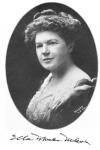By the castle-gate my lady stands,
Viewing broad acres and spreading lands.
Hill and valley and mead and plain
Are all her own, with their wealth of grain.
In the richest of rich robes she is dressed,
A jewel blazes upon her breast;
And her brow is decked with a diadem
That glitters with many a precious gem.
But what to the Lady Wendoline
Rich satin garments or jewels fine?
Or ripening harvests, or spreading lands-
See! she is wringing her milk-white hands!
And her finger is stained with crimson dew
Where the ring with the diamond star cut through.
And a look of pain and wild despair
Rests on the face, so young and fair.
To-morrow will be her bridal day,
And she will barter herself away
For added wealth and a titled name;
'Tis the curse of her station, and whose the blame!
She loathes the man who will call her wife,
And moans o'er her hapless, loveless life.
The joys of wooing she cannot know;
My lord, her father, has willed it so.
She's a piece of merchandise, bought and sold
For name, position, and bags of gold.
But people must wed in their own degree,
Though hearts may break in their agony.
Under the hill, in the castle's shade,
At a cottage door sits an humble maid;
In her cheek the blushes come and go
As she stitches away on a robe like snow;
And she sings aloud in her happiness-
In a joy she cannot hide or repress.
Close at her side her lover stands,
Watching the nimble, sun-browned hands
As they draw the needle to and fro
Through the robe as white as drift of snow.
Both hearts are singing a wordless lay,
For the morrow will be their bridal day.
They have only their hands, their love, their health,
In place of title, position, and wealth.
But which is the rich, and which the poor,
The maid at the gate, or the maid in the door?






